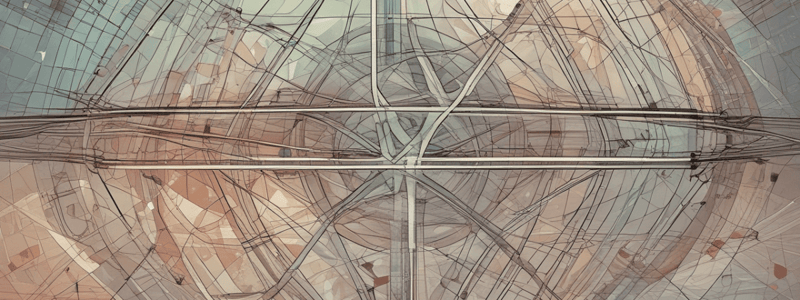Podcast
Questions and Answers
What does the union of two sets represent?
What does the union of two sets represent?
- All elements from either set (correct)
- Common elements from both sets
- Elements that are in both sets
- Elements that are only in one of the sets
Which notation is used to represent the intersection of two sets?
Which notation is used to represent the intersection of two sets?
- A ∪ B
- A + B
- A ∩ B (correct)
- A - B
If sets A and B have no elements in common, what would the intersection A ∩ B be?
If sets A and B have no elements in common, what would the intersection A ∩ B be?
- All elements from A and B
- Elements that are only in A
- The empty set (correct)
- Elements that are only in B
What would the union of two sets containing elements X, Y in set A and Z in set B yield?
What would the union of two sets containing elements X, Y in set A and Z in set B yield?
In the case of complete containment of set B within set A, what are the elements of A ∩ B?
In the case of complete containment of set B within set A, what are the elements of A ∩ B?
What does the union of two sets A and B represent?
What does the union of two sets A and B represent?
In a situation where sets A and B have complete containment, what can be concluded about A ∩ B?
In a situation where sets A and B have complete containment, what can be concluded about A ∩ B?
Which of the following correctly describes the result of the intersection of two sets A and B?
Which of the following correctly describes the result of the intersection of two sets A and B?
What would be the intersection A ∩ B if sets A = {1, 2, 3} and B = {4, 5, 6}?
What would be the intersection A ∩ B if sets A = {1, 2, 3} and B = {4, 5, 6}?
If sets A = {x, y} and B = {y, z}, what is the union A ∪ B?
If sets A = {x, y} and B = {y, z}, what is the union A ∪ B?
Which statement correctly describes the union of two sets A and B in the case of complete containment?
Which statement correctly describes the union of two sets A and B in the case of complete containment?
If two sets A and B are completely overlapping, what can be inferred about their intersection?
If two sets A and B are completely overlapping, what can be inferred about their intersection?
In a scenario where sets A and B do not overlap at all, which of the following holds true for their union?
In a scenario where sets A and B do not overlap at all, which of the following holds true for their union?
Which option incorrectly describes the intersection of two sets A and B with partial overlap?
Which option incorrectly describes the intersection of two sets A and B with partial overlap?
What is the primary distinction between the concepts of union and intersection of two sets?
What is the primary distinction between the concepts of union and intersection of two sets?




